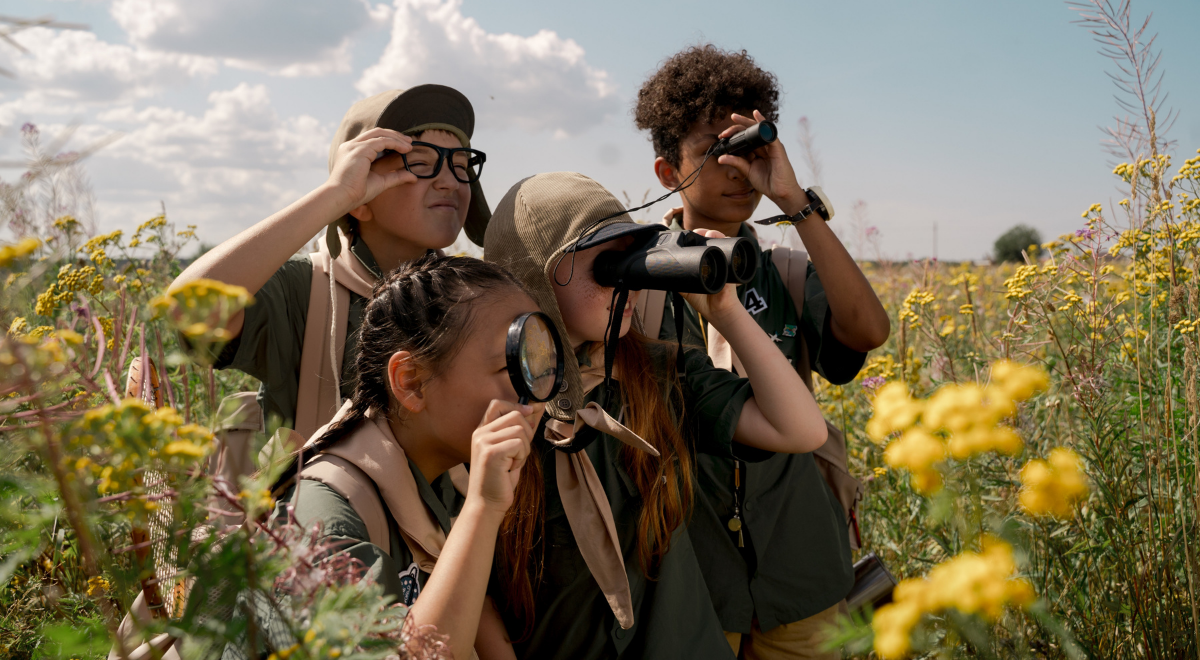Updated April 15, 2024
What do you think of when you hear the word “camp?” Hanging out with friends? Exciting adventures? Discovering new things? Camps are an excellent opportunity to meet different family needs during traditional school breaks in the Northern Hemisphere from June to August.
Just the idea of camp can inspire excitement for learners and families—and not only during the summer season! However, if you teach different types of classes that learners already love, keep it up! Learners are still looking for the flexibility of 1-on-1 tutoring, Courses, Enrichment & Clubs, and one-time classes during the summer.
What is a “camp” on Outschool?
Camps are live classes occurring at least two days a week, or Self-Paced classes with at least two videos a week for up to eight weeks. Camp classes should explore a specific topic or theme through intentional curriculum and community-building.
If you meet these requirements, we recommend adding the keyword “camp” to your class title or description to ensure your camp class shows up on our camps category page.
When can I create a camp course?
Anytime! Many folks only think of camps as a summer activity, but you’ll find learners enthusiastic about joining camp all year long. School breaks or holidays (when learners may not participate in traditional schooling) can be excellent opportunities to connect with families looking for enriching activities to fill extra time at home.
You may also find homeschooling families with flexible schedules looking for camps at different times of the year to hone in on a specific topic or empower their learners to dive deeper into a subject they love.
Typically, camp classes are most popular on Outschool from May to August and again in December when those traditional school breaks occur. Learn more about seasonal demand for different types of courses in this guide.
We recommend updating your summer availability for all classes as soon as spring rolls around. If you plan to host a camp this summer, keep in mind that the earlier you list it, the greater your chances are that you can max out those enrollments! Let’s look at how to make a successful camp to increase your enrollments this summer.
What makes a great virtual summer camp?
Virtual camps are all about forming a community, having fun, and learning without limits. Since you’ll be meeting with camp learners frequently, consider including elements like these in your curriculum:
Academic boot camps
Just because it is summer doesn’t mean that families aren’t looking for academic enrichment during the summer months. To avoid the summer slide, families continue searching for camps to continue working on the skills learned during the school year. Consider offering boot camps or skill intensives that allow learners to keep learning while having fun, even when “school’s out.”
Have a clear project or goal
Families are attracted to camps that have a definitive outcome—or even an element of competition! Will learners complete an art project? Will they get to plan, conduct, and evaluate a science experiment? Will they write and perform a virtual play with their classmates? A clear end goal motivates learners to continue attending camp and feel accomplished.
Hone in on a specific skill
Could you host a camp that teaches a specific skill? Summer camps based on skill-building can provide intensive instruction that empowers learners to leave with newfound confidence in the topic area.
Incorporate team building or social-emotional learning
Your learners will have plenty of time to get to know each other, so take advantage of the opportunity to build a connected classroom community.
Share your passions
Above all – camps are FUN! How can you tap into your learners’ interests with interactive games, enthusiastic instruction, and a shared passion for your topic?

Perfect your camp class listing
Crafting a fun and engaging camp listing requires careful attention to detail and a strategic approach.
Begin by creating a compelling description that shows families the unique experience your camp offers. Use engaging language that resonates with learners, highlighting the innovative activities, educational opportunities, and interactive elements that set your camp apart. By focusing on storytelling and conveying the value of your camp, you can create a compelling online presence that attracts eager participants and fosters excitement for the online adventure ahead!
Here are a couple of key features to consider when creating your camp:
- The keyword “camp” appears in the title and class description to help searchers find your class.
- The camp’s overall goal, project, or theme is clearly outlined, just as it would be for any other style of class.
- The specific topics or activities for each day and/or week are described in appropriate detail within the description.
- Sections are offered from May through early August when many school breaks occur. But don’t wait to post those sections until summer starts—parents begin signing their learners up for camps in early spring!
- The camp lasts at least 3-5 days. And you may create camps lasting up to eight weeks! Keep in mind that many families look for shorter experiences (like skill intensives or boot camps) to accommodate other summer activities on their schedule.
- The camp has a clear theme, skill focus, or project. Use data on classes that need educators, today’s trends, and class topic requests to find themes for your camps that match learners’ interests.

Summer Camp Sample
Here’s a sample listing we created to give you an idea of what parents and learners love to see when searching for camps:
Title
Marvelous Magician Camp – Learn Tricks & Host a Magic Show
Summary
Are you ready to dazzle your friends and family with mystifying magic tricks and stupefying sleight of hand? In this magician camp, you’ll learn, practice, and perfect five magic tricks that you can perform in your own magic show.
(Notice the keywords in both of the above! Families searching for terms like magician, magic tricks, sleight of hand, magic show, and camp may all land on this listing with a search.)
Description
Calling all kids ready to learn the secrets magicians have held close to their chests for centuries! Are you ready to master magic tricks that will blow your audience’s minds and have them ask “How’d you do that?!” repeatedly? Join Teacher Tom (aka The Mysterious Mr. Magic) at Marvelous Magician Camp to learn how to perform classic magic tricks that only require a few simple objects you can find around the house. Astound your fellow magic campers during our in-class magic show on the final day of camp, plus learn how to host your own live magic show for friends and family!
During five days at magic camp, learners will:
Day 1: Learn the basics of sleight of hand, misdirection, and magic performance.
Days 2-4: Practice and perfect five magic tricks, including the Disappearing Coin, Cup Through the Table, Magnetic Pencil, and two card tricks.
Day 5: Choose a magician’s name and learn how to prepare for a home magic show. Each learner will have the chance to perform a magic trick we learned in class or what they have mastered in our concluding session.
This camp is designed for beginner magicians – no experience required! If you already have a few tricks up your sleeve but want to build a foundation in sleight of hand that will help you become a masterful magician, this camp is still for you.

Reach more families with multiple camp options
Consider listing multiple camps of varying lengths, formats, meeting times, and age or skill levels to meet each family’s needs. Offering diverse types of camps can help you connect with learners who live in different time zones, are looking for a particular level of instruction (beginner vs. advanced), and have different availability to attend an online camp.
When choosing a length for your camp, some educators have found success by offering short-term camp listings with additional “optional days” for families who would like to meet for a longer period.
For example, you may list a camp for four days. In the class description, you may include a link to an optional one-time class on the same topic occurring on the “fifth day” that doesn’t require attending the camp (like a trivia game, show and tell, or extra presentation). With this approach, you could capture interest from 4-day campers, 5-day campers, and one-time class learners.
Get ready for opening day
You’re almost there! Once you have your class listed and learners enrolled, it’s time to start preparing for the first day of camp. Get your online curriculum in order and start promoting your classes to families.

